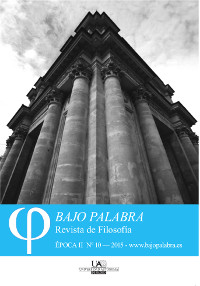Keywords:
Sovereignty, doctrines, consent, resistance, representationCopyright (c) 2015 Diego A. Fernández Peychaux

This work is licensed under a Creative Commons Attribution 4.0 International License.
Abstract
The article points out the theoretical elements in Hobbes’ work, which he uses to develop a reflection on the problematic core of politics. Inscribed in a perennial theoretical debate on the limits of power, the author explains the tensions within exercise of sovereignty. Two related elements stand out in particular: the spectacle of power unifies the sovereign will which is in fact constituted by a fabric of relationships and negotiations; the "location" of right reason in the arbitration of the sovereign does not imply revealing the category of absolute in the "omnipotent". The challenge Hobbes presents, therefore, is the exercise of power balanced between production strategies by consensus and coercion. That is to say, it is the paradox of not only giving strength to bonds by the threat of the sword but also by their own natures.
Downloads
References
Aboy Carlés, G. (2013). “De lo popular a lo populista o el incierto devenir de la plebs”, en Aboy Carles, G.; et al., Las brechas del pueblo. Reflexiones sobre identidades populares y populismo. Buenos Aires: UNGS – UNDAV.
Dotti, J. E. (2000). Carl Schmitt en Argentina. Rosario: Homo Sapiens Ediciones.
Biagini, H. y Fernández Peychaux. 2014. El neuroliberalismo y la ética del más fuerte. Buenos Aires: Octubre.
Grüner, E. (2007). Las formas de la espada. Miserias de la teoría política de la violencia. Buenos Aires: Colihue.
Hampton, J. (1986). Hobbes and the Social Contract Tradition. Cambridge University Press.
Hernández, José María. El retrato de un dios mortal: estudio sobre la filosofía política de Thomas Hobbes. Anthropos Editorial, 2002.
Hindess, B. (1996). Discourses of Power: From Hobbes to Foucault. Oxford: Blackwell.
Hobbes, T. (1640). On the Citizen. Ed. R. Tuck y M. Silverthorne. New York, NY: Cambridge University Press, 1998. Versión castellana: Tratado sobre el ciudadano. Trad. J. Rodríguez Feo. Madrid: UNED-Varia, 2008.
Hobbes, T (1640) The Elements of Law Natural and Politic. Ed. F. Tönnies. Barnes & Noble, 1969. Versión castellana: Elementos de derecho natural y político. Trad. D. Negro Pavón. Madrid: Alianza Editorial, 1979.
Hobbes, T (1651). Leviathan with selected variants from the Latin edition of 1668. Edición, introducción y notas E. Curley. Indianapolis: Hackett, 1994. Versión castellana: Leviatán. Trad. C. Mellizo. Madrid: Alianza Editorial, 1999.
Hobbes, T (1655). «De Corpore», en The English Works of Thomas Hobbes of Malmesbury, vol. 1. Londres: Bohn, 1839. Versión castellana: Tratado sobre el cuerpo. Trad. J. Rodríguez Feo. Madrid: UNED, 2008.
Hobbes, T (1658). “The Questions Concerning Liberty, Necessity, And Chance. Clearly Stated and Debated Between D. Brahmall Bishop of Derry, and Thomas Hobbes of Malmesbury”, en The English Works, op. cit., vol. V. Londres: Bohn, 1841. Versión castellana: Libertad y necesidad, y otros escritos. Trad. B. Forteza Pujol. Barcelona: Península, 1991, pp. 125-171.
Hobbes, T (1668). Behemoth; or, The Long Parliament. Editado por Ferdinand Tönnies. New York: Barnes & Noble, 1969 [1681]. Versión castellana: Behemoth: el Largo Parlamento. Trad. A. Hermosa Andujar. Madrid: Centro de Estudios Constitucionales, 1992.
Hoekstra, K. (2004). The de facto Turn in Hobbes’s Political Philosophy. En T Sorell y L. Foisneau (eds.), Leviathan After 350 Years, 33-73. Oxford, Clarendon Press.
Laclau, E. (1996). Emancipación y diferencia. Buenos Aires: Ariel.
Madanes, L. (2001). El árbitro arbitrario: Hobbes, Spinoza y la libertad de expresión. Buenos Aires: Universidad de Buenos Aires.
Mouffe C. (2011). Carl Schmitt y la paradoja de la democracia liberal. En C. Mouffe (ed.), El desafío de Carl Schmitt, 61-80. Buenos Aires: Prometo.
Pettit, P. (1997) Republicanism: A Theory of Freedom and Government. Oxford University Press.
Pye, C. (1984). “The Sovereign, the Theater, and the Kingdome of Darknesse: Hobbes and the Spectacle of Power”, Representations, No. 8 (Autumn, 1984), pp. 84-106.
Ribeiro, R. (1993). La última razón de los reyes. Trad. Eduardo Rinesi. Buenos Aire: Colihue.
Rinesi, Eduardo (2011). Política y tragedia: Hamlet entre Hobbes y Maquiavelo. 2. ed. Buenos Aires: Colihue.
Rosler, A. (2009). “El conflicto político y la autoridad del derecho: la crítica schmittiana al positivismo liberal”, Storck, A. y Lisboa W. B. (eds.), Norma, moralidade e interpretação: temas de filosofia política e do direito, pp. 115-142. Porto Alegre: Linus Editores.
Schmitt, C. (1927), El concepto de lo político. Trad. R. Agapito. Madrid: Alianza, 2014.
Schmitt, C. (1929), Ética del Estado y Estado pluralista. En En C. Mouffe (ed.), El desafío de Carl Schmitt, 283-300. Buenos Aires: Prometo, 2011.
Schmitt, C. (1996), El Leviathan en la teoría del Estado de Thomas Hobbes. Trad. Francisco Javier Conde. Granada: Comares, 2004.
Skinner, Q. (2008). Hobbes and Republican Liberty. Cambridge University Press.
Skinner, Q. (1998). Liberty Before Liberalism. Cambridge University Press.
Van den Enden, H. (1979). “Thomas Hobbes and the debate on free will. His presentday significance for ethical theory”. Philosophica 24, (2): 185-216.
Zarka, Yves Charles. Hobbes y el pensamiento político moderno. Traducido por Luisa Medrano. Barcelona: Herder, 1997.
Zarka, Yves Charles (2010). “El mito en contra de la razón: Carl Schmitt o la triple traición a Hobbes”, en Y. C. Zarka (coord.), Carl Schmitt o el mito de lo político, pp. 37-54. Trad. D. Trierweiler. Buenos Aires: Nueva Visión.
